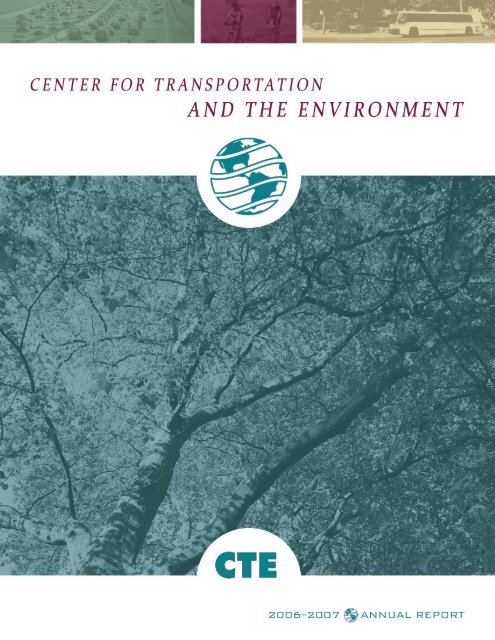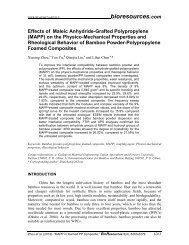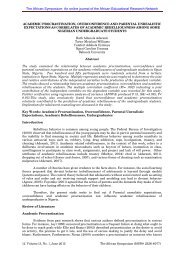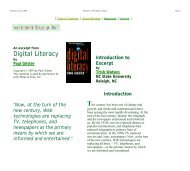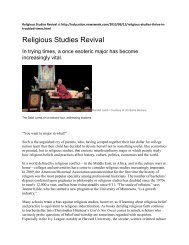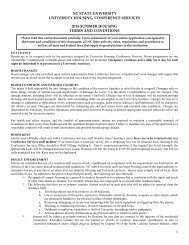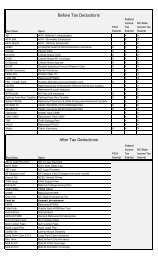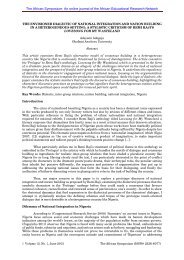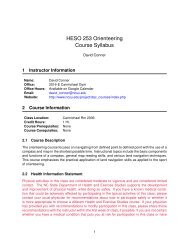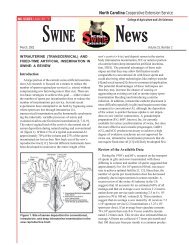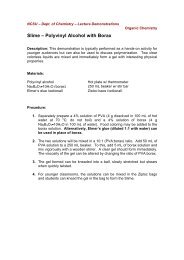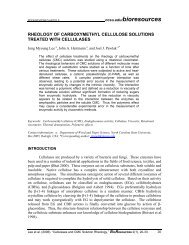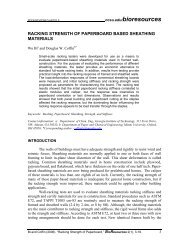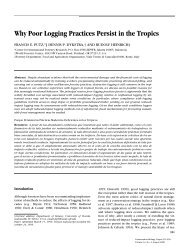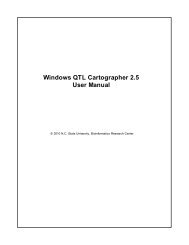Annual Report 2006-2007 - Institute for Transportation Research ...
Annual Report 2006-2007 - Institute for Transportation Research ...
Annual Report 2006-2007 - Institute for Transportation Research ...
You also want an ePaper? Increase the reach of your titles
YUMPU automatically turns print PDFs into web optimized ePapers that Google loves.
2<br />
The Center <strong>for</strong> <strong>Transportation</strong> and the Environment conducts innovative<br />
programs of research, education, and technology transfer that seek to mitigate<br />
the impacts of surface transportation on the environment.<br />
CTE is an activity of the University <strong>Transportation</strong> Centers Program,<br />
administered by the <strong>Research</strong> and Innovative Technology Administration<br />
of the United States Department of <strong>Transportation</strong>.
TABLE OF CONTENTS<br />
4 Message from the Director<br />
5 Financial <strong>Report</strong><br />
6 Management Structure<br />
• CTE Advisory Committee<br />
• ITRE Council<br />
• Center Staff<br />
• Faculty Affilliates<br />
8 <strong>Research</strong> Program<br />
14 Education Program<br />
16 Technology Transfer Program<br />
3
4<br />
The Center <strong>for</strong> <strong>Transportation</strong> and the Environment (CTE) was established in 1991 as a national university<br />
transportation center within the <strong>Institute</strong> <strong>for</strong> <strong>Transportation</strong> <strong>Research</strong> and Education at North Carolina State<br />
University with funding from the Intermodal Surface <strong>Transportation</strong> Efficiency Act. At that time, CTE<br />
purposefully adopted an environmental theme and a national mission to assist transportation professionals with<br />
the challenges associated with this emerging national agenda.<br />
Over the last 15 years CTE has cultivated a network of national partners and mobilized the human and<br />
technological expertise of NCSU and other research institutions to accomplish three primary goals: (1) to<br />
pursue new research on environmental issues in transportation, (2) to advance an education program that<br />
engages students of diverse disciplines in transportation research and that introduces civil engineering students to<br />
the environmental aspects of the transportation profession, and (3) to build a technology transfer program<br />
that provides significant opportunities <strong>for</strong> enhanced communication among transportation professionals,<br />
students and stakeholders about how to implement promising new research innovations and best practices<br />
in the field. Some of the more recent activities that CTE has carried out to achieve these goals are described<br />
throughout this report.<br />
In <strong>2006</strong> CTE was funded by the U.S. Department of <strong>Transportation</strong> as one of the national university transportation<br />
centers of excellence. Through this initiative, the faculty and staff look <strong>for</strong>ward to continuing to work with its<br />
previous partners as well as new ones in addressing environmental and transportation issues of national concern.<br />
CTE intends to serve as a resource <strong>for</strong> advanced research, policy studies, best practices, and educational programs<br />
that help achieve environmental excellence in transportation while improving mobility and safety.<br />
Please let us know of any suggestions you may have as we carry out our mission.<br />
Sincerely,<br />
E. Downey Brill, Jr., Ph.D.<br />
>>> MESSAGE FROM THE DIRECTOR
FINANCIAL REPORT<br />
The Center <strong>for</strong> <strong>Transportation</strong> and the Environment’s total UTC annual operating budget <strong>for</strong> <strong>2006</strong>–<strong>2007</strong> was<br />
$860,000. The U.S. Department of <strong>Transportation</strong> provided $430,000 through the University <strong>Transportation</strong><br />
Centers Program. The North Carolina Department of <strong>Transportation</strong> provided the full state match<br />
requirement of $430,000 through its funding of CTE/NCDOT joint research projects.<br />
50%<br />
50%<br />
Federal State DOT<br />
<strong>2006</strong>–<strong>2007</strong> Funding Sources<br />
• Federal 50%<br />
• State DOT 50%<br />
17% Technology<br />
Transfer<br />
28%<br />
Education<br />
6%<br />
Administration<br />
49%<br />
<strong>Research</strong><br />
<strong>2006</strong>–<strong>2007</strong> Expenditures<br />
• <strong>Research</strong> 49%<br />
• Education 28%<br />
• Technology Transfer 17%<br />
• Administration 6%<br />
5
6<br />
CTE is administered by North Carolina State University and is one of 68 centers, institutes, and laboratories on campus<br />
that report to the Office of the Vice Chancellor <strong>for</strong> <strong>Research</strong> and Graduate Studies. The Center is located on NCSU<br />
Centennial Campus in the offices of the <strong>Institute</strong> <strong>for</strong> <strong>Transportation</strong> <strong>Research</strong> and Education (ITRE).<br />
The Center’s research, education, and technology transfer programs are guided by the CTE Advisory Committee, which<br />
provides valuable input on program activities. The committee is composed of representatives from government,<br />
academia, and non-profits. In addition, ITRE’s advisory council receives regular updates on CTE activities and provides<br />
input at the request of the Center’s director, Dr. E. Downey Brill, Jr.<br />
>>> CTE ADVISORY COMMITTEE<br />
Anne B. Canby<br />
President<br />
Surface <strong>Transportation</strong> Policy Project<br />
Washington, DC<br />
Gorman Gilbert, PhD, PE<br />
Director, Oklahoma <strong>Transportation</strong> Center<br />
Oklahoma State University<br />
Stillwater, OK<br />
Nagui M. Rouphail, PhD<br />
Director<br />
<strong>Institute</strong> <strong>for</strong> <strong>Transportation</strong> <strong>Research</strong> and Education<br />
Raleigh, NC<br />
>>> ITRE COUNCIL<br />
John Cameron, PhD<br />
Managing Partner<br />
TransTech Management, Inc.<br />
Greensboro, NC<br />
Eugene Conti, Jr., PhD<br />
Vice President<br />
PBS&J<br />
Raleigh, NC<br />
Larry Goode, PhD, PE<br />
Director of <strong>Transportation</strong> Planning, Policy and Finance<br />
Civil, Construction and Environmental Engineering<br />
North Carolina State University<br />
Raleigh, NC<br />
David Harkey, PhD, PE<br />
Director<br />
Universityof North Carolina Highway Safety <strong>Research</strong> Center<br />
Chapel Hill, NC<br />
Edd Hauser, PhD, PE<br />
Professor and Director<br />
Center <strong>for</strong> <strong>Transportation</strong> Policy Studies<br />
University of North Carolina at Charlotte<br />
Charlotte, NC<br />
David King<br />
General Manager<br />
Triangle Transit Authority<br />
<strong>Research</strong> Triangle Park, NC<br />
>>> MANAGEMENT STRUCTURE<br />
Robert E. Skinner<br />
Executive Director<br />
<strong>Transportation</strong> <strong>Research</strong> Board<br />
Washington, DC<br />
Lyndo Tippett<br />
Secretary of <strong>Transportation</strong><br />
North Carolina Department of <strong>Transportation</strong><br />
Raleigh, NC<br />
George List, PhD, PE<br />
Professor and Department Head<br />
Civil, Construction and Environmental Engineering<br />
North Carolina State University<br />
Raleigh, NC<br />
John F. Sullivan, III<br />
Division Administrator<br />
Federal Highway Administration – North Carolina Division<br />
Raleigh, NC<br />
Lyndo Tippett<br />
Secretary of <strong>Transportation</strong><br />
North Carolina Department of <strong>Transportation</strong><br />
Raleigh, NC<br />
C.E. "Ed" Vick, Jr.<br />
Chairman<br />
Kimley-Horn & Associates, Inc.<br />
Raleigh, NC<br />
C. Michael Walton, PhD, PE<br />
Professor of Civil Engineering<br />
University of Texas at Austin<br />
Austin, TX<br />
Jim Westmoreland, PE<br />
Director of <strong>Transportation</strong><br />
City of Greensboro<br />
Greensboro, NC
CENTER STAFF<br />
E. Downey Brill, Jr., PhD<br />
Director<br />
James B. Martin, MCE, PE<br />
Associate Director<br />
Janet L. D’Ignazio, MRP<br />
Senior <strong>Research</strong> Associate<br />
Leigh B. Lane, BSCE<br />
Senior <strong>Research</strong> Associate<br />
David Robinson, PhD, PE<br />
Senior <strong>Research</strong> Associate<br />
Ann Hartell, MRP<br />
<strong>Research</strong> Associate<br />
>>> UNIVERSITY FACULTY AFFILIATES<br />
H. Christopher Frey, PhD<br />
Professor of Civil Engineering<br />
Water Resources/Environmental Engineering<br />
North Carolina State University<br />
Raleigh, NC<br />
Joseph E. Hummer, PhD, PE<br />
Professor of Civil Engineering<br />
<strong>Transportation</strong> Systems and Materials<br />
North Carolina State University<br />
Raleigh, NC<br />
Margery F. Overton, PhD<br />
Professor of Civil Engineering<br />
Water Resources/Environmental Engineering<br />
North Carolina State University<br />
Raleigh, NC<br />
>>> MANAGEMENT STRUCTURE<br />
Teresa L. Townsend, MA, AICP<br />
<strong>Research</strong> Associate<br />
Kathryn P. McDermott, MA<br />
Technology Transfer Director<br />
Eugene Murray, BA<br />
Distance Learning Specialist<br />
Walt Thomas, BA<br />
In<strong>for</strong>mation Processing Assistant<br />
Carol M. Zarker<br />
Technology Support Analyst<br />
Nancy Bailey, MLS<br />
Web Developer<br />
Sethu Raman, PhD<br />
Professor of Atmospheric and Marine Sciences<br />
North Carolina State University<br />
Raleigh, NC<br />
John R. Stone, PhD<br />
Associate Professor of Civil Engineering<br />
<strong>Transportation</strong> Systems and Materials<br />
North Carolina State University<br />
Raleigh, NC<br />
Billy M. Williams, PhD, PE<br />
Assistant Professor of Civil Engineering<br />
<strong>Transportation</strong> Systems and Materials<br />
North Carolina State University<br />
Raleigh, NC<br />
7
8<br />
>>> RESEARCH PROGRAM<br />
CTE partners with the North Carolina Department of <strong>Transportation</strong> to conduct a joint environmental research<br />
program. This partnership was established in 1998 following the Center’s reauthorization in the <strong>Transportation</strong><br />
Equity Act <strong>for</strong> the 21st Century (TEA-21).<br />
Each year the NCDOT <strong>Research</strong> and Development Unit issues a solicitation <strong>for</strong> proposals based on the<br />
transportation research needs of the state. Representatives from CTE, ITRE, and the FHWA NC Division Office<br />
serve on the technical advisory committee responsible <strong>for</strong> reviewing and selecting research projects. Contracts<br />
<strong>for</strong> all project awards are administered by ITRE. Center staff serve on each individual environmental research<br />
project committee, which is responsible <strong>for</strong> providing overall guidance to the principal investigator(s)<br />
and monitoring their progress through project completion.<br />
The CTE/NCDOT partnership has generated significant research results in various environmental areas, including<br />
air quality, water quality, wetlands mitigation, vegetation management, and wildlife management. During<br />
<strong>2006</strong>–<strong>2007</strong>, the research program involved the active participation of more than 52 students and 27 faculty<br />
representing many academic disciplines.<br />
For more in<strong>for</strong>mation on the program and research projects, please visit the CTE website at www.cte.ncsu.edu/cte/research.<br />
>>> NEW PROJECTS<br />
The following new research projects were awarded<br />
during the <strong>2006</strong>–07 reporting period.<br />
Stilling Basin Design and Operation <strong>for</strong> Water<br />
Quality: Field Testing (HWY–<strong>2007</strong>–02)<br />
Per<strong>for</strong>ming Organization: North Carolina State University<br />
Principal Investigator: Dr. Richard A. McLaughlin<br />
Period: January, <strong>2007</strong> – June, 2008<br />
Platinum Markers as Indicators of <strong>Transportation</strong><br />
Impact (HWY-<strong>2007</strong>-03)<br />
Per<strong>for</strong>ming Organization: North Carolina State University<br />
Principal Investigators: Dr. W. Gregory Cope, Dr. Thomas J.<br />
Kwak, Dr. Damian Shea<br />
Period: July, <strong>2006</strong> – June, 2009<br />
Evaluation of Nutrient Loading Rates<br />
and Effectiveness of Roadside Vegetative<br />
Connectivity <strong>for</strong> Managing Runoff from<br />
Secondary Roads (HWY-<strong>2007</strong>-04)<br />
Per<strong>for</strong>ming Organization: Universityof North Carolinaat Charlotte<br />
Principal Investigators: Dr. Jy Wu, Dr. Craig Allan<br />
Period: July, <strong>2006</strong> – December, 2008<br />
Effects of Highway Construction in the Sedgefield<br />
Lakes and King’s Mill Watersheds (HWY-<strong>2007</strong>-17)<br />
Per<strong>for</strong>ming Organization: North Carolina State University<br />
Principal Investigators: Dr. Daniel E. Line, Dr. Jean Spooner<br />
Period: July, <strong>2006</strong> – June, <strong>2007</strong><br />
<strong>Research</strong> of Hydrologic and Water Quality<br />
Per<strong>for</strong>mance of Four Linear Wetlands in Eastern<br />
North Carolina and House Creek Watershed<br />
Interchange Retrofits (HWY-<strong>2007</strong>-21)<br />
Per<strong>for</strong>ming Organization: North Carolina State University<br />
Principal Investigator: Dr. William Hunt<br />
Period: March, <strong>2007</strong> – June, 2009
ONGOING PROJECTS<br />
The following research projects were in progress or in<br />
the draft final report stage during this reporting period.<br />
Characterization of the Genus Alasmidonta in North<br />
Carolina to Facilitate Accurate Environmental Impact<br />
Assessments (HWY-0754)<br />
Per<strong>for</strong>ming Organization: North Carolina State University<br />
Principal Investigators: Dr. Jay F. Levine, Dr. Morgan Raley, Dr.<br />
Arthur E. Bogan (North Carolina Museum of Natural Sciences)<br />
Period: August, 2003 – June, <strong>2006</strong><br />
Stream Restoration Success Criteria and Monitoring<br />
Protocols (HWY-2005-04)<br />
Per<strong>for</strong>ming Organization: North Carolina State University<br />
Principal Investigators: Dani Wise Johnson, Dr. Jean Spooner<br />
Period: July, 2004 – June, <strong>2007</strong><br />
Evaluating Systems to Reduce Road Improvement<br />
Impacts on Mountain Streams (HWY-2005-05)<br />
Per<strong>for</strong>ming Organization: North Carolina State University<br />
Principal Investigators: Dr. Richard A. McLaughlin,<br />
Dr. Gregory D. Jennings<br />
Period: July, 2004 – June, <strong>2007</strong><br />
Evaluation of Manufactured Stormwater Best<br />
Management Practices (HWY-<strong>2006</strong>-04)<br />
Per<strong>for</strong>ming Organization: University of North<br />
Carolina at Charlotte<br />
Principal Investigators: Dr. Craig Allan, Dr. Jy Wu<br />
Period: May, <strong>2006</strong> – April, 2008<br />
Real World Duty Cycles and Utilization <strong>for</strong><br />
Construction Equipment in North Carolina<br />
(HWY-<strong>2006</strong>-08)<br />
Per<strong>for</strong>ming Organization: North Carolina State University<br />
Principal Investigators: Dr. H. Christopher Frey,<br />
Dr. William Rasdorf<br />
Period: July, 2005 – June, <strong>2007</strong><br />
>>> RESEARCH PROGRAM<br />
Effectiveness of Bear Crossings on I-26 in Madison<br />
County, North Carolina (HWY-<strong>2006</strong>-14)<br />
Per<strong>for</strong>ming Organization: North Carolina State University<br />
Principal Investigators: Dr. Richard A. Lancia, Dr. Phillip<br />
D. Doerr<br />
Period: July, 2005 – September, <strong>2007</strong><br />
Evaluating Sediment Capture Rates <strong>for</strong> Different<br />
Sediment Basin Designs (HWY-<strong>2006</strong>-17)<br />
Per<strong>for</strong>ming Organization: North Carolina State University<br />
Principal Investigator: Dr. Richard A. McLaughlin<br />
Period: July, 2005 – June, <strong>2007</strong><br />
Stilling Basin Design and Operation <strong>for</strong> Water Quality<br />
(HWY-<strong>2006</strong>-22)<br />
Per<strong>for</strong>ming Organization: North Carolina State University<br />
Principal Investigator: Dr. Richard A. McLaughlin<br />
Period: August, 2005 – October, <strong>2006</strong><br />
Shoreline Monitoring at Oregon Inlet Terminal Groin<br />
(HWY-<strong>2007</strong>-18)<br />
Per<strong>for</strong>ming Organization: North Carolina State University<br />
Principal Investigator: Dr. Margery F. Overton<br />
Period: July, <strong>2006</strong> – June, <strong>2007</strong><br />
Ongoing Maintenance and Enhancement of<br />
Precipitation Alert and Visualization Tool in Support<br />
of NCDOT’s Storm Water Quality Monitoring<br />
(HWY-<strong>2007</strong>-20)<br />
Per<strong>for</strong>ming Organization: North Carolina State University<br />
Principal Investigator: Dr. Sethu Raman<br />
Period: July, <strong>2006</strong> – June, 2009<br />
9
10<br />
>>> COMPLETED PROJECTS<br />
The following research projects were completed, and a<br />
final report issued, during the <strong>2006</strong>–07 reporting<br />
period. Final reports and other project details are<br />
available through the CTE website at<br />
www.cte.ncsu.edu/cte/research.<br />
Assessment of Groundwater Flows at Juniper Bay<br />
and their Impacts on the Surrounding Area<br />
(HWY-2002-19)<br />
Per<strong>for</strong>ming Organization: North Carolina State University<br />
Principal Investigators: Dr. Rodney L. Huffman, Dr. Michael<br />
J. Vepraskas<br />
Period: May, 2002 – December, <strong>2006</strong><br />
Evaluation and Implementation of BMPs <strong>for</strong><br />
NCDOT’s Highways and Industrial Facilities<br />
(HWY-2003-19)<br />
Per<strong>for</strong>ming Organization: University of North<br />
Carolina at Charlotte<br />
Principal Investigators: Dr. Jy Wu, Dr. Craig Allan<br />
Period: July, 2002 – March, <strong>2006</strong><br />
Methodology to Assess Soil, Hydrologic, and Site<br />
Parameters that Affect Wetland Restoration –<br />
Phase II (HWY-2004-19)<br />
Per<strong>for</strong>ming Organization: North Carolina State University<br />
Principal Investigator: Dr. Michael J. Vepraskas<br />
Period: July, 2003 – June, <strong>2006</strong><br />
>>> RESEARCH PROGRAM<br />
Ecological Assessment of a Wetlands Mitigation<br />
Bank – Phase IV: Post-Restoration (HWY-2005-06)<br />
Per<strong>for</strong>ming Organization: University of North<br />
Carolina at Asheville<br />
Principal Investigators: Dr. Kevin K. Moorhead, Dr. James<br />
Petranka, Dr. Irene Rossell<br />
Period: July, 2004 – June, <strong>2006</strong><br />
Propagation of Freshwater Mussels <strong>for</strong> Release<br />
into North Carolina Waters (HWY-2005-07)<br />
Per<strong>for</strong>ming Organization: North Carolina State University<br />
Principal Investigators: Dr. Jay F. Levine, Dr. Morgan Raley,<br />
Chris Eads, Dr. Arthur E. Bogan (North Carolina Museum of<br />
Natural Sciences)<br />
Period: July, 2004 – June, <strong>2006</strong><br />
Development of Methods to Determine Lateral<br />
Effect of Highway Drainage Systems on Wetland<br />
Hydrology – Phase 2 (HWY-2005-21)<br />
Per<strong>for</strong>ming Organization: North Carolina State University<br />
Principal Investigator: Dr. R. Wayne Skaggs<br />
Period: July, 2004 – June, <strong>2006</strong><br />
Determination of Lateral Effects of Borrow Pits on<br />
Hydrology of Adjacent Wetlands (HWY-2005-24)<br />
Per<strong>for</strong>ming Organization: North Carolina State University<br />
Principal Investigator: Dr. R. Wayne Skaggs<br />
Period: September, 2004 – August, <strong>2007</strong>
U.S. DEPARTMENT OF TRANSPORTATION RESEARCH<br />
Environmental Implications of Current<br />
Domestic Trends in Goods Movement<br />
To ensure the development of U.S. policies that continue to<br />
facilitate efficient freight movement, government<br />
decisionmakers need more in<strong>for</strong>mation on how domestic<br />
transportation operators, shippers, consignees, and others<br />
are responding to broader trade and freight transportation<br />
trends. This research, led by CTE faculty affiliate, Dr. Billy M.<br />
Williams, addresses these issues in the context of ports and<br />
other freight hubs.<br />
Integration of CSS in<br />
the <strong>Transportation</strong><br />
Planning Process<br />
In January <strong>2007</strong> CTE<br />
completed a two-year<br />
research project,<br />
sponsored by the<br />
Federal Highway<br />
Administration, to<br />
determine best<br />
practices associated<br />
with integrating<br />
context sensitive<br />
solutions (CSS) into<br />
transportation<br />
planning. Addressing CSS during planning<br />
incorporates core natural, historic, cultural, aesthetic, scenic,<br />
and socioeconomic concerns through a collaborative, open,<br />
and interdisciplinary process.<br />
Materials <strong>for</strong> Web and print publication were developed by<br />
CTE that include an assessment of CSS as applied to<br />
planning, a toolkit of fact sheets, questions and answers, and<br />
case studies <strong>for</strong> both states and local communities. The final<br />
report provides recommendations on ways to incorporate<br />
CSS into transportation planning and the connection with<br />
SAFETEA-LU requirements <strong>for</strong> long-range planning. To view<br />
the final report, visit the FHWA website at<br />
www.wa.dot.gov/planning/csstp/csstransplan.htm.<br />
>>> RESEARCH PROGRAM<br />
Greenhouse Gas Reductions in Freight<br />
<strong>Transportation</strong><br />
This important USDOT research project, led by CTE faculty<br />
affiliate, Dr. Chris Frey, investigates current ef<strong>for</strong>ts within the<br />
multi-modal freight transportation sector to reduce<br />
emissions of greenhouse gases (GHG) in order to develop a<br />
guidebook of best practices and promising initiatives. GHG<br />
emissions from freight transportation, which are largely<br />
based on energy use, are expected to increase significantly in<br />
the future as energy use <strong>for</strong> all freight modes increases. This<br />
research provides in<strong>for</strong>mation useful to decisionmakers in<br />
the freight transportation sector in identifying, evaluating,<br />
and adopting similar technological and operational<br />
strategies <strong>for</strong> reducing energy use and GHG emissions. The<br />
best practices guidebook resulting from the study is available<br />
from the CTE website at<br />
www.cte.ncsu.edu/cte/downloads/research/ghgguidebook.pdf.<br />
Support <strong>for</strong> the North Carolina Ecosystem<br />
Enhancement Program<br />
During <strong>2006</strong>-<strong>2007</strong> CTE continued its support of the North<br />
Carolina Ecosystem Enhancement Program (EEP), a unique<br />
partnership between the North Carolina Department of<br />
<strong>Transportation</strong>, N.C. Department of Environment and<br />
Natural Resources, and the U.S. Army Corps of Engineers.<br />
EEP is a national model program <strong>for</strong> protecting wetlands<br />
from the environmental impacts of transportation<br />
infrastructure improvements. CTE senior research associate,<br />
Dr. David Robinson, works on-site with EEP in its strategic<br />
planning, program design and procedure development. Since<br />
2003 CTE has actively supported EEP in its ongoing ef<strong>for</strong>ts to<br />
preserve and protect wetlands, streams and riparian areas<br />
throughout the state.<br />
11
12<br />
>>> CTE RESEARCH PRESENTED AT TRB<br />
>>> RESEARCH PROGRAM<br />
In January, <strong>2007</strong>, five papers authored or coauthored by CTE researchers were selected <strong>for</strong> presentation at the<br />
<strong>Transportation</strong> <strong>Research</strong> Board (TRB) annual meeting in Washington, D.C. Through the TRB, CTE research<br />
contributes to the national discourse on transportation and environmental issues and serves as an important resource<br />
<strong>for</strong> transportation-related decisionmaking. The research chosen <strong>for</strong> presentation includes:<br />
• Three papers coauthored and presented by CTE senior research associate, Janet D’Ignazio:<br />
o Context-Sensitive Solutions, Value Engineering, and Asset Management: Creating and Maintaining<br />
Value, Improving Accountability, and Reaching <strong>for</strong> Sustainability;<br />
o Current Department of <strong>Transportation</strong> Environmental Management System Development Ef<strong>for</strong>ts:<br />
Examples from Construction, Maintenance, Project Development, and Planning; and<br />
o Integrating CSS Into Management, Planning, and Design.<br />
• Integrating Context Sensitive Solutions in Day to Day Activities: In<strong>for</strong>mation from a Post Training Survey,<br />
coauthored and presented by CTE senior research associate, Leigh Lane. CTE research associates, Brian Byfield<br />
and Ann Hartell, also coauthored the report.<br />
• Methodological Challenges of Environmental Justice Assessments <strong>for</strong> <strong>Transportation</strong> Projects, authored and<br />
presented by CTE research associate, Ann Hartell. This paper also was selected <strong>for</strong> publication in the TRB’s<br />
<strong>Transportation</strong> <strong>Research</strong> Record.<br />
>>> PARTICIPATION IN NCHRP RESEARCH<br />
In <strong>2006</strong>-<strong>2007</strong> CTE was actively involved in three projects<br />
<strong>for</strong> the National Cooperative Highway <strong>Research</strong> Program<br />
(NCHRP). Administered by the <strong>Transportation</strong> <strong>Research</strong><br />
Board, NCHRP conducts research in acute problem areas<br />
that affect highway planning, design, construction,<br />
operation, and maintenance nationwide.<br />
NCHRP Project 8-36, Task 66, Improved<br />
Methods <strong>for</strong> Assessing Social, Cultural and<br />
Economic Effects of <strong>Transportation</strong> Projects<br />
Working in partnership with Cambridge Systematics, CTE<br />
per<strong>for</strong>med the lead research to identify and describe social<br />
(human) indicators that reflect quality of life considerations<br />
during the transportation decisionmaking process. This<br />
research leverages the Center’s extensive base of both completed<br />
and ongoing community impact assessment, context sensitive<br />
solutions, and socioeconomic research. Cambridge Systematics<br />
provided staff input on matters involving demographics,<br />
geographic in<strong>for</strong>mation systems, quantitative methods, and<br />
statewide and metropolitan area transportation planning.<br />
Principal research was conducted in spring-fall <strong>2007</strong>, with<br />
a final report submitted to NCHRP <strong>for</strong> publication in 2008.<br />
NCHRP Project 20-5, Synthesis 373, Multi-<br />
Disciplinary Teams in Context-Sensitive Solutions<br />
CTE staff conducted research to document the current<br />
knowledge and practice of state departments of<br />
transportation in using multi-disciplinary teams to develop<br />
context sensitive<br />
solutions (CSS). The<br />
final report, to be<br />
published by NCHRP<br />
in 2008, presents<br />
in<strong>for</strong>mation from a<br />
nationwide survey,<br />
review of available<br />
literature, and<br />
examination of all<br />
state DOT websites<br />
<strong>for</strong> in<strong>for</strong>mation on<br />
CSS policies and<br />
programs. Guidelines<br />
are provided in the<br />
report to point out<br />
areas where practices
can be revised to make multi-disciplinary teams an even<br />
more effective part of achieving CSS.<br />
Use of temporary bridging in Eldorado National Forest, Cali<strong>for</strong>nia<br />
NCHRP Project 25-30, The Use of Temporary<br />
Bridging to Avoid and Minimize Impacts to<br />
Waters and Wetlands during Highway<br />
Construction<br />
CTE is assisting Mulkey Engineering and Consultants, Inc.<br />
in its nationwide research to study the practicality of using<br />
temporary bridging methods to avoid or minimize the<br />
impacts of roadway construction on rivers, wetlands, and<br />
other waters. Employing alternative methods such as<br />
floating or prefabricated bridges can create an opportunity<br />
to protect the environment and reduce costs. The results of<br />
the study, which included Web-based and phone surveys of<br />
over 100 potential respondents, are discussed in detail in<br />
the project’s final report.<br />
As a companion to the report, CTE and Mulkey are<br />
producing a guidebook incorporating key in<strong>for</strong>mation<br />
from the survey to assist decisionmakers with the selection<br />
>>> RESEARCH PROGRAM<br />
and use of temporary bridging <strong>for</strong> traffic detours or<br />
construction access. The guidebook provides an overview<br />
of the main types of temporary bridging, factors that<br />
influence their selection, a decision matrix <strong>for</strong> determining<br />
the applicability of temporary bridging types to various<br />
conditions, state examples of lessons learned, and<br />
recommendations <strong>for</strong> the future. Publication of the<br />
guidebook and final report by NCHRP is anticipated in 2008.<br />
13
14<br />
For more than a decade CTE’s education program has<br />
been encouraging undergraduate and graduate students<br />
of diverse academic disciplines to participate in<br />
transportation and environmental research and to<br />
consider potential careers in the field. The Center’s<br />
educational outreach also extends to the professional<br />
development needs of practitioners. More in<strong>for</strong>mation<br />
about CTE’s education program can be found at<br />
www.cte.ncsu.edu/cte/education.<br />
A principal focus of CTE’s education program in <strong>2006</strong>-<br />
<strong>2007</strong> has been in the area of Context Sensitive Solutions<br />
(CSS), a collaborative process <strong>for</strong> transportation<br />
planning and design to achieve solutions to<br />
transportation projects that integrate with the<br />
environment and communities they serve. Through the<br />
ef<strong>for</strong>ts of the Center’s outstanding research associates,<br />
CTE has been a nationally recognized leader in CSS<br />
research and education since 2003.<br />
Graduate-Level Engineering CSS Course<br />
During Fall semester, <strong>2006</strong>, CTE and North Carolina<br />
State University's Department of Civil, Construction<br />
and Environmental Engineering launched a new<br />
graduate-level course on the principles and practices of<br />
Context Sensitive Solutions. Funded through a contract<br />
with Federal Highway Administration, the new<br />
curriculum helps students develop a greater awareness<br />
of how to plan and deliver transportation projects that<br />
support community values without compromising<br />
safety, cost efficiency, and integrity of the natural<br />
environment. The curriculum is available <strong>for</strong> use at civil<br />
and environmental engineering programs nationwide,<br />
and can be download at<br />
www.cte.ncsu.edu/cte/education/csscoursefiles.asp.<br />
CSS Summer Academy<br />
In cooperation with the North Carolina Department of<br />
<strong>Transportation</strong>, CTE since 2004 has conducted a<br />
unique, experiential summer program <strong>for</strong> junior- and<br />
senior-level undergraduate students interested in<br />
careers in transportation. The Context Sensitive<br />
Solutions Summer Academy introduces students to the<br />
principles of CSS and teaches how CSS concepts are<br />
>>> EDUCATION PROGRAM<br />
CSS Summer Academy Class of <strong>2007</strong><br />
applied at various levels of transportation planning,<br />
project development, construction, operations and<br />
maintenance.<br />
CTE researchers and North Carolina State University<br />
engineering faculty lead the academy’s students<br />
through coursework and case study activities. In<br />
addition to classroom instruction, students work as<br />
NCDOT summer interns and participate in field trips<br />
that showcase real-world CSS applications such as<br />
bypass construction, railroad crossings, and bridge<br />
replacement projects. The students serve in positions<br />
that directly address transportation and environmental<br />
concerns, conduct research and interviews, and write a<br />
case study related to their assignments. At the<br />
Academy’s conclusion students give final presentations<br />
of their findings to a group of NCDOT staff, other<br />
professionals, and university faculty.<br />
Seventeen undergraduate juniors and seniors<br />
successfully completed the <strong>2006</strong> and <strong>2007</strong> academies,<br />
<strong>for</strong> a total of 23 student participants since the program<br />
began. More than 50 different NCDOT projects have<br />
been researched and analyzed as case study activities.<br />
The CSS Summer Academy experience helps to better<br />
prepare students <strong>for</strong> their transportation careers and in<br />
turn helps improve future transportation project<br />
planning. More in<strong>for</strong>mation about the CSS Summer<br />
Academy can be found at<br />
www.cte.ncsu.edu/cte/education.
Student Spotlight<br />
Dawn Rierson<br />
B.S., Biological Engineering<br />
NC State University<br />
CSS Summer Academy Class of <strong>2006</strong><br />
Now employed as an NCDOT<br />
<strong>Transportation</strong> Engineering Associate<br />
The CSS Academy demonstrated the challenges of a<br />
relationship between transportation and the<br />
environment and the importance of facing and<br />
resolving these challenges. I hope my career path will<br />
be involved in the environmental aspects of<br />
transportation engineering. I wish to be mindful of<br />
how my engineering designs will impact the natural<br />
and human environment.<br />
The academy prepared me to understand the<br />
importance of maintaining and fostering relationships<br />
between NCDOT, NCDENR, and other federal and<br />
state agencies to reach consensus on differences of<br />
opinions on issues. These relationships are the<br />
foundation of successful CSS.<br />
Thank you <strong>for</strong> the opportunity to participate in the<br />
CSS Academy!<br />
Context Sensitive Solutions Training<br />
"Context Sensitive Solutions: A Better Way" is a three-day<br />
training course developed by CTE <strong>for</strong> the North Carolina<br />
Department of <strong>Transportation</strong>. First delivered in 2003, the<br />
training covers CSS approaches and tools from<br />
transportation planning, project development, and design<br />
to right-of-way, construction, operations, and<br />
maintenance. Participants learn through lectures, case<br />
study presentations, facilitated group discussions, and<br />
decision-making exercises. During <strong>2006</strong>-<strong>2007</strong> CTE<br />
>>> EDUCATION PROGRAM<br />
conducted CSS training throughout North Carolina to 315<br />
NCDOT employees. To date, CTE has delivered over 50<br />
CSS courses to more than 1,500 transportation department<br />
staff, local agencies and consultant groups across the state.<br />
Community Impact Assessment Training<br />
Community Impact Assessment (CIA) is the process used<br />
to analyze proposed transportation actions and determine<br />
their effects on the human and social environment. CIA is<br />
crucial to making balanced transportation decisions that<br />
preserve, protect and enhance quality of life. CTE in<br />
<strong>2006</strong>-<strong>2007</strong> conducted a series of Federal Highway<br />
Administration-sponsored CIA training courses <strong>for</strong><br />
DOT professionals examine alternatives at CIA class<br />
the Alaska, Illinois, Maryland, Utah and North Carolina<br />
state departments of transportation. Over 270 DOT<br />
professionals in the five states were successfully<br />
prepared to incorporate the FHWA CIA process in<br />
both transportation planning and project development.<br />
NCDOT Merger 01 Training<br />
CTE further extends its partnership with the North<br />
Carolina Department of <strong>Transportation</strong> by providing<br />
instructional and administrative support <strong>for</strong> the<br />
department’s Merger 01 training courses. Merger 01<br />
is a process to streamline transportation project<br />
development and permitting. The process provides a<br />
<strong>for</strong>um <strong>for</strong> federal, state and local agencies to discuss<br />
and reach consensus on ways to meet the regulatory<br />
requirements of Section 404 of the Clean Water Act<br />
during the NEPA/SEPA decision-making phase. In<br />
<strong>2006</strong>-<strong>2007</strong> CTE assisted NCDOT in its Merger 01<br />
training of more than 170 executives and practitioners.<br />
More in<strong>for</strong>mation can be found on the NCDOT website<br />
at www.ncdot.org/doh/preconstruct/pe/merger01.<br />
15
16<br />
Through technology transfer, CTE fosters enhanced<br />
communication and collaboration among<br />
transportation and environmental professionals. The<br />
program uses state-of-the-art media and traditional<br />
<strong>for</strong>ums to connect students and practitioners with new<br />
research and technology developments, best practices,<br />
and emerging policy issues. Videoconferencing and<br />
web-based technologies are key tools <strong>for</strong> meeting the<br />
Center’s technology transfer objectives. For more<br />
in<strong>for</strong>mation on the CTE technology transfer program,<br />
please visit the website at<br />
www.cte.ncsu.edu/cte/techtransfer.<br />
National Teleconference Series<br />
CTE’s National Teleconference Series (NTS) offers an<br />
annual schedule of live satellite and web broadcasts<br />
featuring expert panels that address transportation and<br />
environmental issues of national concern with a diverse<br />
audience of government, non-government, university,<br />
and private sector representatives. The series is also an<br />
effective plat<strong>for</strong>m <strong>for</strong> agencies and organizations to<br />
showcase successful partnerships and innovations.<br />
Since 1994, CTE has conducted 42 NTS teleconferences<br />
reaching tens of thousands of students, practitioners,<br />
and decisionmakers. Broadcasts are delivered via web<br />
streaming and a through a satellite downlink network<br />
of more than 200 sites, including the U.S.<br />
Environmental Protection Agency’s Air Pollution<br />
Distance Learning Network. During <strong>2006</strong>-<strong>2007</strong> CTE<br />
scheduled four NTS broadcasts. In addition, the Center<br />
produced two special webcast series – comprising six<br />
programs in total – <strong>for</strong> the Izaak Walton League of<br />
America. For more in<strong>for</strong>mation on CTE<br />
teleconferences, including access to previous<br />
broadcasts, please visit the website at<br />
www.cte.ncsu.edu/cte/techtransfer/teleconferences.<br />
Bicycle/Pedestrian Planning Strategies: From<br />
SAFETEA-LU to Safe Routes to School<br />
(Satellite/Web Broadcast May 4, <strong>2006</strong>)<br />
In November, 2005, CTE launched a series of broadcasts<br />
to highlight key provisions and implementation of the<br />
Safe, Accountable, Flexible, Efficient <strong>Transportation</strong><br />
>>> TECHNOLOGY TRANSFER PROGRAM<br />
NTS offers live satellite and web broadcasts<br />
Equity Act: A Legacy <strong>for</strong> Users (SAFETEA- LU). The<br />
second broadcast in the series, Bicycle/Pedestrian<br />
Planning Strategies, focuses on the SAFETEA- LU<br />
provisions and expanded federal legislation that<br />
support bicycle and pedestrian programming, planning<br />
and funding. The three-hour program features an<br />
expert panel highlighting creative approaches<br />
underway nationally which illustrate how well-planned<br />
and well-designed bicycle and pedestrian initiatives can<br />
improve mobility, enhance safety and foster healthier<br />
and more livable communities.<br />
Overviewof theProposed Rulemakingon Planning<br />
(Satellite/Web Broadcast July 13, <strong>2006</strong>)<br />
In partnership with the Federal Transit Administration<br />
and Federal Highway Administration, CTE continued<br />
its SAFETEA-LU series with this two-hour broadcast on<br />
the planning and environmental provisions of the new<br />
law. Panelists from FTA and FHWA headquarters in<br />
Washington, D.C., are featured in the broadcast, which<br />
served as a part of each agency’s public outreach ef<strong>for</strong>ts<br />
to provide important in<strong>for</strong>mation about the proposed<br />
rule to federal, state, and local transportation staff,<br />
planners, and other decisionmakers.<br />
The International Stormwater BMP Database: A<br />
Resource <strong>for</strong> BMP Selection and Design Guidance<br />
(Satellite/Web Broadcast November 29, <strong>2006</strong>)<br />
The International Stormwater Best Management<br />
Practices (BMP) Database (www.bmpdatabase.org)
serves as a central clearinghouse <strong>for</strong> BMP data to help<br />
improve BMP selection, design, and per<strong>for</strong>mance. This<br />
two-hour broadcast introduces viewers to the history<br />
and significant findings of the BMP database, and<br />
includes guidance on monitoring and examples of how<br />
various municipalities and state DOTs are contributing<br />
to and utilizing the database.<br />
Overview of the Final Rule on Metropolitan<br />
and Statewide <strong>Transportation</strong> Planning<br />
(Satellite/Web Broadcast April 19, <strong>2007</strong>)<br />
This broadcast, the fourth in CTE’s SAFETEA-LU series,<br />
follows up on the July <strong>2006</strong> program as panelists from the<br />
Federal Transit Administration and Federal Highway<br />
FTA and FHWA officials discuss SAFETEA-LU<br />
provisions during an NTS broadcast<br />
Administration return to discuss the final rule on the<br />
metropolitan and statewide transportation planning<br />
provisions of SAFETEA-LU. The two-hour broadcast<br />
provides an overview of the final rule, including a summary<br />
of public comments received during the Notice of<br />
Proposed Rulemaking.<br />
Izaak Walton League of America Webcast Series<br />
From March to December, <strong>2006</strong>,<br />
CTE partnered with the Izaak Walton<br />
League of America (IWLA), a<br />
national conservation organization,<br />
to produce two series of live web<br />
broadcasts related to conserving<br />
>>> TECHNOLOGY TRANSFER PROGRAM<br />
wetlands through land management: Backyard<br />
Wetland Conservation and Alternative Practices<br />
<strong>for</strong> Highway Stormwater Management. The two<br />
in<strong>for</strong>mative series were made possible with support<br />
from the Federal Highway Administration, the U.S.<br />
Environmental Protection Agency, the Bureau of Land<br />
Management, the U.S.D.A. Forest Service, and the U.S.<br />
Fish and Wildlife Service.<br />
Each program in the IWLA series features a discussion<br />
panel of national experts and Q&A with participating<br />
viewers. The webcasts were well received, drawing<br />
questions and participation from viewers in more than<br />
40 states and over 1,700 peak hits to the webcast server.<br />
For more in<strong>for</strong>mation on the IWLA webcast series,<br />
please visit the CTE website at www.cte.ncsu.edu/cte/<br />
techtransfer/teleconferences/iwla<strong>2006</strong>.asp.<br />
Web Streaming <strong>for</strong> EPA Broadcasts<br />
Continuing a long-standing technology transfer<br />
partnership with the U.S. Environmental<br />
Protection Agency (EPA), CTE in <strong>2006</strong>-<strong>2007</strong><br />
provided web streaming and hosting <strong>for</strong><br />
three broadcast programs produced by the<br />
EPA Agency Office of Air Quality Planning and<br />
Standards (OAQPS). These programs first were carried live<br />
over the EPA’s Air Pollution Distance Learning Network,<br />
then transferred to the Center’s web server <strong>for</strong> on-demand<br />
viewing and archiving.<br />
• The <strong>2007</strong> Clean Air Act Update (April <strong>2007</strong>)<br />
• Air Quality Data & Tools <strong>for</strong> Ozone Season<br />
& Beyond (July <strong>2007</strong>)<br />
• PM 2.5 Implementation (September <strong>2007</strong>)<br />
To view these and other EPA broadcasts, visit the CTE<br />
website at www.cte.ncsu.edu/cte/techtransfer/<br />
teleconferences/epa<strong>2007</strong>.asp.<br />
17
18<br />
>>> WORKSHOPS AND CONFERENCES<br />
CTE regularly co-sponsors and serves as lead<br />
organizer of workshops and conferences that relate<br />
to the Center's mission of mitigating the impacts<br />
of surface transportation development on the environment.<br />
The following events were conducted under<br />
CTE's co-sponsorship during the <strong>2006</strong>-<strong>2007</strong> period:<br />
International Conference on<br />
Ecology and <strong>Transportation</strong><br />
May 20–25, <strong>2007</strong><br />
(Little Rock, Arkansas)<br />
A major technology transfer<br />
event <strong>for</strong> CTE in <strong>2006</strong>-<strong>2007</strong> was<br />
the International Conference on<br />
Ecology and <strong>Transportation</strong>. ICOET is an international,<br />
multidiscipline conference that addresses the broad<br />
spectrum of ecological issues related to surface<br />
transportation planning and project development.<br />
ICOET <strong>2007</strong> was conducted in Little Rock, Arkansas, in<br />
coordination with the host agency, the Arkansas State<br />
Highway and <strong>Transportation</strong> Department. Principally<br />
sponsored by the Federal Highway Administration, the<br />
<strong>2007</strong> conference was broadly supported by 37 additional<br />
federal resource agencies, state transportation agencies,<br />
universities, non-governmental organizations, and<br />
private consulting firms.<br />
The biennial conference drew over 350 transportation<br />
and environmental experts from around world to<br />
discuss new research and best practices that improve<br />
the integration of ecological concerns in transportation<br />
planning and project development. More than 120<br />
technical presentations and poster displays were<br />
featured relating to the conference theme “Bridging the<br />
Gaps, Naturally.” Attendees and technical presenters<br />
representing 14 countries, including the U.S., Australia,<br />
Canada, France, Hungary, India, Portugal, Spain, South<br />
Korea, and The Netherlands, came to discuss solutions<br />
to ecological issues related to transportation.<br />
The conference website, www.icoet.net/icoet<strong>2007</strong>.asp,<br />
contains a complete conference agenda (with links to<br />
abstracts, speaker bios, and participant lists), sponsor<br />
>>> TECHNOLOGY TRANSFER PROGRAM<br />
listings, video clips of conference sessions, and a PDF<br />
version of the final proceedings. CTE also produced<br />
print and CD-ROM versions of the <strong>2007</strong> proceedings,<br />
which are available upon request.<br />
ICOET <strong>2007</strong>, marking CTE’s fourth opportunity as<br />
lead organizer <strong>for</strong> the conference, was considered a<br />
major success. CTE will continue its role as lead<br />
organizer <strong>for</strong> the next conference scheduled <strong>for</strong> fall<br />
2009 in Duluth, Minnesota.<br />
FHWA Awards at ICOET <strong>2007</strong><br />
ICOET <strong>2007</strong> also served <strong>for</strong> the first time as a venue<br />
<strong>for</strong> the FHWA Environmental Excellence Awards<br />
ceremony. Rick Capka, FHWA Administrator, and<br />
Gloria Shepherd, Associate Administrator (pictured<br />
above), Carol Adkins, Water and Ecosystems Team<br />
Leader, and other agency leaders were in attendance<br />
to recognize the biennial award winners in twelve<br />
environmental categories.
2nd Workshop on Impacts of Global Climate Change<br />
on Hydraulics, Hydrology and <strong>Transportation</strong><br />
March 29, <strong>2006</strong> (Washington, DC)<br />
CTE served as co-sponsor and lead organizer <strong>for</strong><br />
the second in a series of workshops to examine the<br />
implications of global climate change and possible sea<br />
level rise on hydraulics, hydrology, and transportation<br />
infrastructure design. More than 30 research scientists and<br />
government officials from the United States convened in<br />
Washington, D.C., to present current research related to<br />
transportation and climate change, and to discuss future<br />
research needs.<br />
CTE conducted this workshop in cooperation with the<br />
USDOT Center <strong>for</strong> Climate Change and Environmental<br />
Forecasting, the Coastal <strong>Transportation</strong> Engineering<br />
<strong>Research</strong> and Education Center (University of South<br />
Alabama), and the Ports and Waterways Center at Texas<br />
<strong>Transportation</strong> <strong>Institute</strong> (Texas A&M University). More<br />
in<strong>for</strong>mation about the workshop, its participants, and<br />
presentations <strong>for</strong> download are available on the CTE<br />
website at<br />
www.cte.ncsu.edu/cte/techtransfer/GCCworkshop<strong>2006</strong>.asp.<br />
<strong>Transportation</strong>, Land-Use, Planning,<br />
and Air Quality Conference<br />
July 9-11, <strong>2007</strong> (Orlando, Florida)<br />
This conference focused on the latest developments in<br />
transportation planning and land use modeling, and<br />
new developments and strategiesthat result in air<br />
quality benefits. CTE, along with TRB’s <strong>Transportation</strong><br />
Air Quality Committee (ADC20) and Access<br />
Management Committee (ADA70), served as an official<br />
co-sponsor of the conference. The well-attended event<br />
attracted nearly 200 transportation and environmental<br />
professionals from around the nation. For more<br />
in<strong>for</strong>mation, visit the conference website at<br />
www.ctre.iastate.edu/educweb/transaq/transaq<br />
<strong>2007</strong>.htm.<br />
Context Sensitive Solutions: An AASHTO/FHWA<br />
Peer Exchange<br />
September 6-8, <strong>2006</strong> (Baltimore, Maryland)<br />
CTE, the American Association of State Highway and<br />
<strong>Transportation</strong> Officials (AASHTO), and the Federal<br />
>>> TECHNOLOGY TRANSFER PROGRAM<br />
Highway Administration collaborated on this successful<br />
three-day conference, attracting 262 federal and state<br />
agency participants representing 46 state DOTs, the<br />
District of Columbia, Puerto Rico, and Nova Scotia. The<br />
peer exchange engaged transportation stakeholders in<br />
facilitated sessions that explored the successes, challenges,<br />
and lessons learned from CSS implementation since the<br />
1998 “Thinking Beyond the Pavement” workshop. CTE<br />
served as lead organizer <strong>for</strong> the event to manage the<br />
conference activities, facilitate discussion sessions, and<br />
assist AASHTO/FHWA in documenting the proceedings.<br />
AASHTO/FHWA Workshop on Implementing CSS<br />
As a follow-up to the successful peer exchange on context<br />
sensitive solutions conducted in Baltimore, MD, CTE was<br />
invited by AASHTO and FHWA to facilitate a one-day<br />
planning workshop to refine the defining principles of CSS.<br />
This workshop laid the ground work <strong>for</strong> a joint<br />
AASHTO/FHWA strategic plan that will help states more<br />
effectively implement CSS. In May, <strong>2007</strong>, CTE submitted<br />
its final report from the workshop, "Results of the Joint<br />
AASHTO/FHWA Context Sensitive Solutions Strategic<br />
Planning Process."<br />
Partnerships with TRB<br />
CTE continues to provide technology transfer assistance<br />
to environmental committees of the <strong>Transportation</strong><br />
<strong>Research</strong> Board through the Center’s hosting of committee<br />
websites and by the administration of listservs<br />
<strong>for</strong> committee members and their peers. CTE is pleased<br />
to support these TRB environmental committees:<br />
• TRB ADC10 Committee (Environmental Analysis<br />
in <strong>Transportation</strong>)<br />
• TRB ADC30 Committee (Ecology and<br />
<strong>Transportation</strong>)<br />
• TRB ADC50 Committee (Historic and<br />
Archaeological Preservation in <strong>Transportation</strong>)<br />
To learn more about the Center’s support of TRB on<br />
these and other initiatives, visit the CTE website at<br />
www.cte.ncsu.edu/cte/trbpartners.<br />
19
The Center <strong>for</strong> <strong>Transportation</strong> and the Environment is a university transportation center funded by the U.S.<br />
Department of <strong>Transportation</strong> and North Carolina Department of <strong>Transportation</strong>, and located at North Carolina<br />
State University within the offices of the <strong>Institute</strong> <strong>for</strong> <strong>Transportation</strong> <strong>Research</strong> and Education.<br />
For more in<strong>for</strong>mation about CTE, or to inquire about partnership opportunities, please contact:<br />
James B. Martin, Associate Director<br />
(919) 515-8620<br />
jbm@ncsu.edu<br />
Or visit our website: www.cte.ncsu.edu


